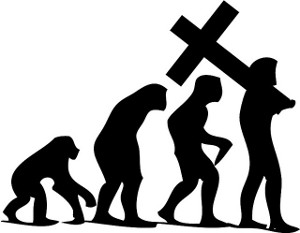
A recent survey of high school biology teachers shows the majority don’t take a solid stance on evolution with their students. Fewer than 30 percent of teachers take an adamant pro-evolutionary stance, while the majority hedge on the topic in order to avoid potential conflict. A full 13% openly teach creationism.
President Obama’s “Sputnik moment” call to inspire a new generation of science students stands in stark contrast to the stifled educations being offered to most of today’s kids. The argument is often that teaching creationism as science might stunt a student’s biology career, but it shouldn’t prevent producing scads of software engineers and physicists. But that’s sophistry. A lot of the innovation space with the rapidly aging populace is in medicine and biology, so there is a need for people who really understand the life sciences. But moreover, when a child’s early exposure to science of any flavor is basically that a bunch of whackos in lab coats have this nutty idea, but really the way the world works is something else, they learn an inherent distrust of science in general. Why would a student want to pursue a career using the same fundamental techniques that yielded such “flawed theories” as evolution? It requires a pretty significant cognitive dissonance to believe that biology, geology, anthropology, cosmology, and several other sciences are fundamentally wrong, but quantum physics is right on the money.
The prevalence of creationism in schools does matter. Children require inspiration to pursue careers in science and technology. And teachers, especially science teachers, who don’t have enthusiasm for the field or reject the discipline altogether are certainly not being inspirational.
It would be easy but overly simplistic to dismiss this as just a problem in our schools. The reality is that teachers are human. They reflect the values, beliefs, and attitudes of the society as a whole. Considering that repeated studies have shown about 45% of the population in general believe the universe is less than 10,000 years old, science teachers are already well outside the mainstream. The answers here don’t lie in fixing the schools as much as in fixing society. Children are not often motivated toward goals their parents openly reject. When almost half of parents reject science as hooey, it’s not surprising that kids are not flocking to the field.
Industry doesn’t help here either. While demand for science and tech jobs has picked up a bit, the outsourcing of entry level positions to overseas markets continues to make it challenging for average students to find work after college. If the U.S. is to grow the next generation of talent, we have to be willing to plant the seeds domestically by hiring fresh grads.
In addition, society doesn’t treat science as credible, cool, or aspirational. The CSI and Mythbusters television shows have helped make science seem a bit more interesting and mainstream. But science and tech careers are still things perceived to be pursued largely by those geeky kids who seems inexorably destined for lab coats from birth. Yet that minority of kids will not be sufficient to fuel a new Apollo program.
If this is truly a Sputnik moment, we need to inspire a big chunk of the “normal” kids to get their geek on. Teachers are a part of that. Government is a part of that. But unless society as a whole embraces it, it will not succeed.
